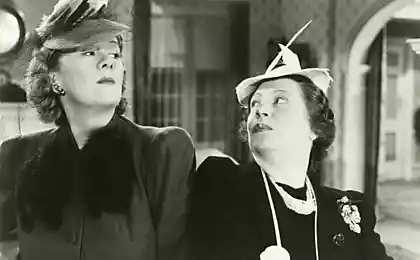543
The art of taming envy
Envy — desired sense by which we strive to become better and want to achieve more. But sometimes envy ceases to perform useful functions, and instead spur them on to new achievements, only nibbles, forcing nasty to think about others and to consider himself a loser.Envy is a normal human emotion, which is one of the most socially unacceptable because of its "toxic" form of high-pervasive in society, threatening its existence. But I'm not talking about the society and the envy, which leads to revolutions, and about individual process. Envy, like other "bad" feelings like shame or anger, have so much to offer someone who can get in touch with them and relive them.

The starting point of envy is the feeling of a deficit of what the other has, and what he would like to have. The heart — envy. But then there comes a fork in the road. Healthy envy performs, like most emotions, impulses to action, and then, we are endeavouring to make up for the deficit after what you want. In this case, the other person plays the role of the assistant in the detection and a failure. And speech not necessarily goes about things. I can see the excellent work of colleagues in the Supervisory group and envy, because, I think, so I have not yet obtained. And my envy detects my insecurities in certain aspects of the work, highlights the direction for the effort. With this envy, I do not seek to denigrate those who I have caused, and not even the desire to transcend — there is a desire to make efforts in order to develop further yourself. The feeling is still not pleasant, but mobilizing.
There's another chain leading to the present poisoning of envy, which is a feeling I do not like. Chain toxic envy looks like this:
a) the Feeling of deficit also has another (it can be objects, phenomena like the perfect relationship, or specific skills, or events in a person's life events).
b) the Feeling of inferiority/inferiority and the impossibility of obtaining the desired good.
C) Anger/resentment on the other, which is much needed, but real or imaginary unattainable object/quality, etc.
g) the Desire to compensate for an unattainable good through the competition.
Competition is of two varieties. The first more or less innocent: the person begins to look at other objects/phenomena that are "not worse". For example, looking at the end of the holiday season strips in social networks and watching the mass of people who are povykladyval your photos with different the Caribbean, Hawaii or at least from under the Vladivostok, you can console yourself all summer spent at home, the fact that "but we are the one-and-a-awesome repair done, and they last money on the loan, go!". Instead of admit his desire to be somewhere in the warm seas, trying to shut his frustration or fatigue, that might be comforting.
The second type of competition is a direct attempt to devalue the other, his achievements or attempt to inflict immediate harm. Here the anger and the feeling of inferiority takes place in full strength, and begins another revenge for his success. From the "but they have relations with my husband is terrible" and "stole, bitch!" to direct actions caused harm. I've read somewhere the words of a German anthropologist who worked for many years in Nigeria. He said, "you know what you'll be the envy of European envy in the African? For example, will be released in the morning European from home, and find that the neighbor's house is taller and better than him. What do the Europeans? He will make every effort that his house was worse. And that leaves the African morning from your cabin, and see that the hut of the neighbour is better than twice. What do African? He hires a sorcerer to cast a spell on the owner of a large cabin."
The modern world provides a huge opportunity for envy. Read notes of a traveller who visited the countries that you just can't; see harmonious relations with neighbors/friends/stars/characters on the background of its own collapse; life in other countries that seem better than mine; the career of the friend who started the same way as you but now have gone far ahead... an Avalanche of information about the lives of other people falls on people. If in the past people have compared themselves only with their neighbors (which consisted of the rural "world"), which mainly differed in the level of wealth or quality of life in General, now before the man unfolds the panorama of the present world. The panorama is highly distorted, deformed.
Toxic envy is very conducive to the position of the observer — when not concentrating on his life and the challenges and objectives which it sets before us, and the other lives that are so deceptively easy to open before us. Pitfalls of those or other achievements, we do not see, besides the few who will post his routine and often boring life in a social network. Envy is a lot of idealizing someone jealous. It's kind of a paradoxical form of recognition of achievements.
Envy can get even a feeling that if the other is any good, it just will not go to you. That is like the owner of a good stole it from you, and then to envy and added another fear. He is especially strong if the resource is really limited.
So envy involves the awareness of scarcity, the fear that will not get a feeling of inferiority, anger and resentment, recognition and competition. Quite escape the fear is impossible, like any other normal social sense. To reduce the amount — Yes, if you concentrate on your own life, not someone else's, and their standards, and not for others. And then if the other person will have that to which you yourself aspire, it will be a stimulus to development, not self-poisoning. By itself, jealousy does not poison — poisons the sense of inferiority. No "black" or "white" envy, because there the basis — a sense of deficiency. If we are able to be happy for other people's successes is not a "white envy" and joy. In General, as usual, it's not about emotions/feeling, and what to do with this feeling: take it and translate into action, to repress or deny...
And what about the envy of others to us? No way. To never be the object of another's envy, it is very hard to make his life as gray and miserable.
ILYA LATYPOV
источник:livejournal.com
Source: /users/1080

The starting point of envy is the feeling of a deficit of what the other has, and what he would like to have. The heart — envy. But then there comes a fork in the road. Healthy envy performs, like most emotions, impulses to action, and then, we are endeavouring to make up for the deficit after what you want. In this case, the other person plays the role of the assistant in the detection and a failure. And speech not necessarily goes about things. I can see the excellent work of colleagues in the Supervisory group and envy, because, I think, so I have not yet obtained. And my envy detects my insecurities in certain aspects of the work, highlights the direction for the effort. With this envy, I do not seek to denigrate those who I have caused, and not even the desire to transcend — there is a desire to make efforts in order to develop further yourself. The feeling is still not pleasant, but mobilizing.
There's another chain leading to the present poisoning of envy, which is a feeling I do not like. Chain toxic envy looks like this:
a) the Feeling of deficit also has another (it can be objects, phenomena like the perfect relationship, or specific skills, or events in a person's life events).
b) the Feeling of inferiority/inferiority and the impossibility of obtaining the desired good.
C) Anger/resentment on the other, which is much needed, but real or imaginary unattainable object/quality, etc.
g) the Desire to compensate for an unattainable good through the competition.
Competition is of two varieties. The first more or less innocent: the person begins to look at other objects/phenomena that are "not worse". For example, looking at the end of the holiday season strips in social networks and watching the mass of people who are povykladyval your photos with different the Caribbean, Hawaii or at least from under the Vladivostok, you can console yourself all summer spent at home, the fact that "but we are the one-and-a-awesome repair done, and they last money on the loan, go!". Instead of admit his desire to be somewhere in the warm seas, trying to shut his frustration or fatigue, that might be comforting.
The second type of competition is a direct attempt to devalue the other, his achievements or attempt to inflict immediate harm. Here the anger and the feeling of inferiority takes place in full strength, and begins another revenge for his success. From the "but they have relations with my husband is terrible" and "stole, bitch!" to direct actions caused harm. I've read somewhere the words of a German anthropologist who worked for many years in Nigeria. He said, "you know what you'll be the envy of European envy in the African? For example, will be released in the morning European from home, and find that the neighbor's house is taller and better than him. What do the Europeans? He will make every effort that his house was worse. And that leaves the African morning from your cabin, and see that the hut of the neighbour is better than twice. What do African? He hires a sorcerer to cast a spell on the owner of a large cabin."
The modern world provides a huge opportunity for envy. Read notes of a traveller who visited the countries that you just can't; see harmonious relations with neighbors/friends/stars/characters on the background of its own collapse; life in other countries that seem better than mine; the career of the friend who started the same way as you but now have gone far ahead... an Avalanche of information about the lives of other people falls on people. If in the past people have compared themselves only with their neighbors (which consisted of the rural "world"), which mainly differed in the level of wealth or quality of life in General, now before the man unfolds the panorama of the present world. The panorama is highly distorted, deformed.
Toxic envy is very conducive to the position of the observer — when not concentrating on his life and the challenges and objectives which it sets before us, and the other lives that are so deceptively easy to open before us. Pitfalls of those or other achievements, we do not see, besides the few who will post his routine and often boring life in a social network. Envy is a lot of idealizing someone jealous. It's kind of a paradoxical form of recognition of achievements.
Envy can get even a feeling that if the other is any good, it just will not go to you. That is like the owner of a good stole it from you, and then to envy and added another fear. He is especially strong if the resource is really limited.
So envy involves the awareness of scarcity, the fear that will not get a feeling of inferiority, anger and resentment, recognition and competition. Quite escape the fear is impossible, like any other normal social sense. To reduce the amount — Yes, if you concentrate on your own life, not someone else's, and their standards, and not for others. And then if the other person will have that to which you yourself aspire, it will be a stimulus to development, not self-poisoning. By itself, jealousy does not poison — poisons the sense of inferiority. No "black" or "white" envy, because there the basis — a sense of deficiency. If we are able to be happy for other people's successes is not a "white envy" and joy. In General, as usual, it's not about emotions/feeling, and what to do with this feeling: take it and translate into action, to repress or deny...
And what about the envy of others to us? No way. To never be the object of another's envy, it is very hard to make his life as gray and miserable.
ILYA LATYPOV
источник:livejournal.com
Source: /users/1080























